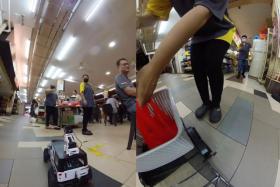Tech Bites: Loved ones are just a kiss away
Researchers from the Imagineering Lab at City University London have come up with a device that allows those in long-distance relationships to kiss through their phones, reported The Verge. Their new Kissenger gadget, which can be plugged into a smartphone and has a portion made of silicon, mimics a real kiss using pressure sensors and actuators.
The gadget is paired with a messaging app, also called Kissenger.
Drones will deliver blood to Tanzania
The UK government is set to fund a trial of drone-based deliveries of blood and other medical supplies in Tanzania, reported BBC.
The goal is to radically reduce the amount of time it takes to send stock to health clinics in the African nation by road or other means.
The scheme involves Zipline, a Silicon Valley start-up that began running a similar service in Rwanda in October.
Experts praised that initiative but cautioned that "cargo drones" are still of limited use to humanitarian bodies.
The Department for International Development has not said how much money will be invested in the Tanzanian effort or for how long.
New Audis will warn of red lights with new feature
Audi recently became the first automaker to offer traffic light information as a fully integrated feature in its new vehicles, reported Digital Trends.
Audi first collects the traffic data from the driver's municipality, and broadcasts the information to the car, where the data is compared with GPS data.
The information is displayed as a picture of a traffic light in its current state with a counter giving its best prediction of when the light is likely to change.
Audi is running a pilot programme in Las Vegas, Nevada.
Security expert warns of smart electricity meters
Smart electricity meters, of which there are more than 100 million installed globally, are "dangerously insecure", a security expert was quoted as saying by the Guardian.
The lack of security could mean malicious code could cut power to a home, or cause overload leading to exploding meters or fires, co-founder of security firm Vaultra Netanel Rubin said.
The problems stem from half-hearted implementations and weak design principles, he said.
He urged utility companies to do more to protect customers.
Get The New Paper on your phone with the free TNP app. Download from the Apple App Store or Google Play Store now



